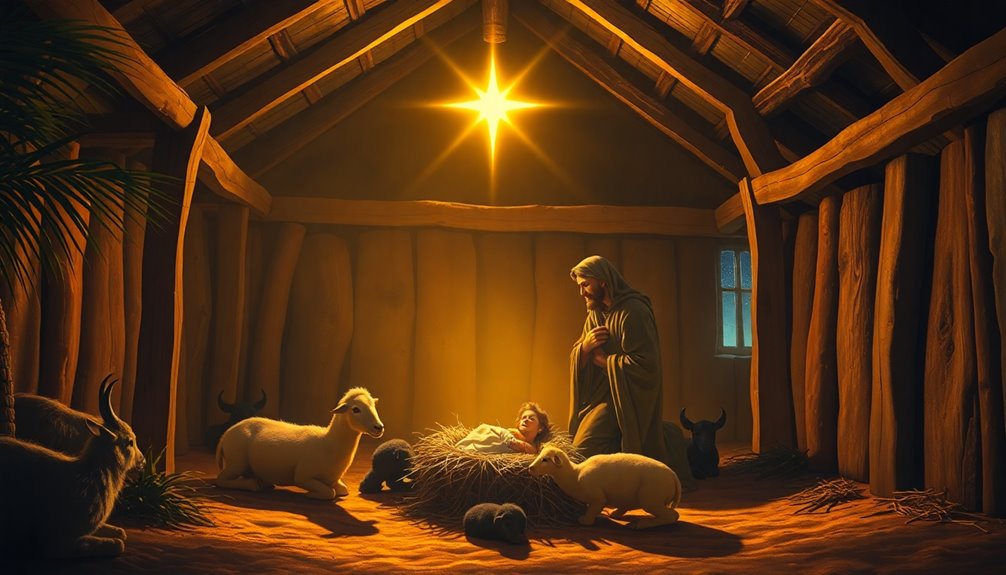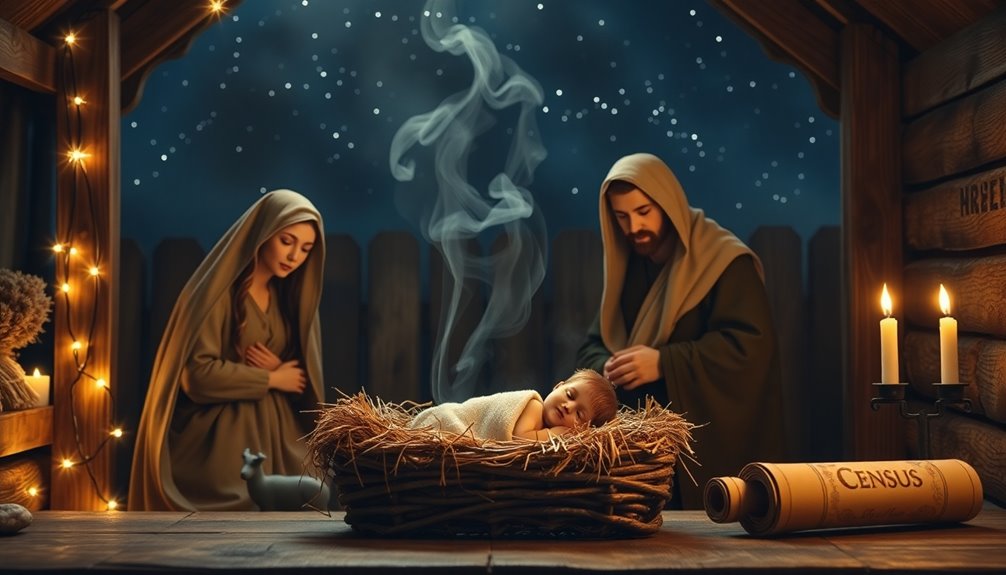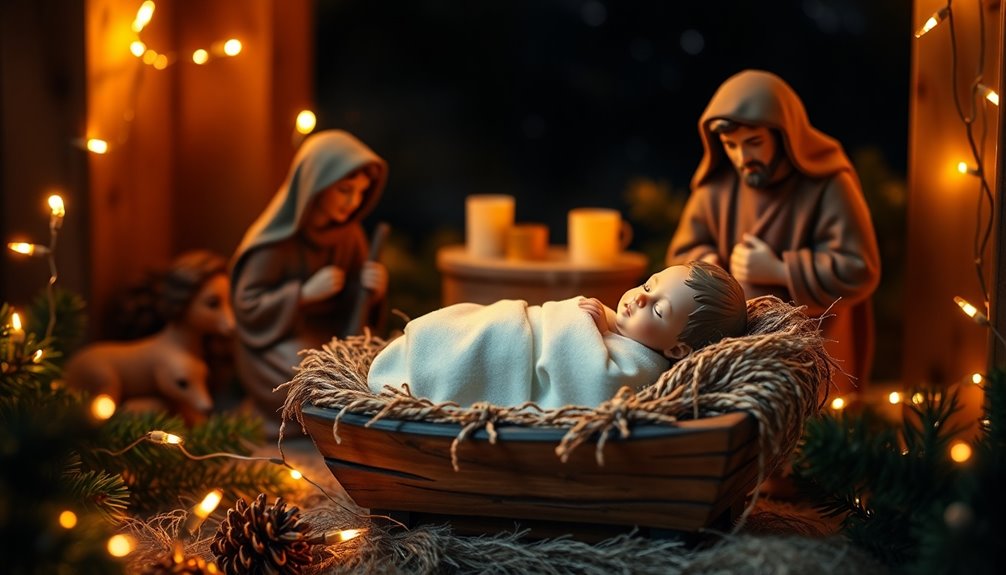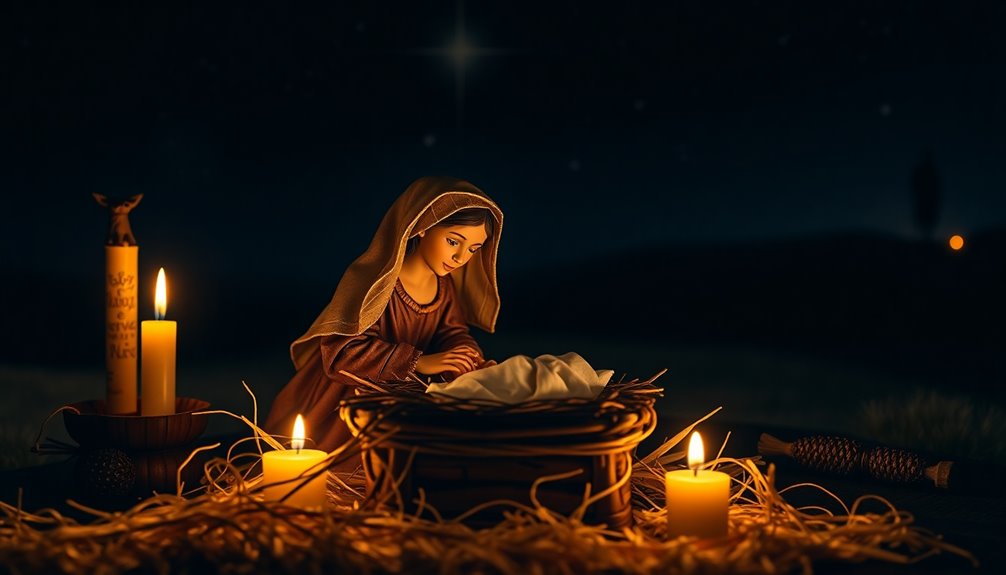Jesus' birthday is traditionally celebrated on December 25, but the actual date is uncertain. Scholars suggest his birth likely occurred between 6 and 4 BC, influenced by a census ordered by Emperor Augustus. This census brought Mary and Joseph to Bethlehem, fulfilling prophecies. December 25 was chosen by the Roman Catholic Church in the 4th century, aligning with pagan winter solstice festivals. While this date carries significant cultural importance, it lacks historical evidence of being the true birthday. Each Gospel offers unique insights into the nativity; explore what these accounts reveal about this pivotal moment in history.
Key Takeaways
- Jesus' birth is estimated to have occurred between 6 and 4 BC, with December 25 celebrated as Christmas since the 4th century.
- The Gospels of Matthew and Luke provide distinct nativity accounts, emphasizing the theological significance of Jesus' birth.
- December 25 is often mistakenly believed to be Jesus' actual birth date, lacking historical evidence for this claim.
- Early Christians did not celebrate Jesus' birth, and the choice of December 25 was influenced by pagan winter solstice festivals.
- Astronomical theories suggest celestial events may have marked Jesus' birth, enriching the understanding of this significant event.
Introduction

When it comes to the birth of Jesus, many people are curious about the details and significance surrounding this pivotal event in history. The exact date of Jesus' birth remains a mystery, with historical estimates suggesting it happened between 6 and 4 BC, largely based on the timeline of King Herod's reign and death.
Interestingly, December 25th became the official celebration of Jesus' birth, established by the Roman Catholic Church in the 4th century. This date likely aligned with pagan winter solstice festivals, making it easier for early Christians to adopt the holiday.
The Gospels of Matthew and Luke provide nativity accounts, focusing more on the theological significance of Jesus' birth rather than strict historical chronology. Various astronomical events, such as potential planetary conjunctions, have been proposed to explain the Star of Bethlehem, a key symbol linked to Jesus' nativity.
Understanding the cultural and historical context surrounding these narratives enriches discussions about the significance of Jesus' birth. Ultimately, whether celebrated on December 25th or any other day, the event remains central to the Christmas celebration, reminding us of its profound impact on history and faith.
Biblical Birth Narratives

When you look at the biblical birth narratives, you'll notice distinct accounts in the Gospels of Matthew and Luke.
Matthew highlights the royal lineage and the visit of the Magi, while Luke focuses on the humble circumstances and the shepherds.
Each narrative offers unique insights into the significance of Jesus' birth and its fulfillment of prophecy.
Primary Bible References
Drawing from the Gospels of Matthew and Luke, the biblical narratives of Jesus' birth present key events that shape the story of His arrival.
The Gospel of Matthew details significant moments, such as the visit of the Magi, who follow a star to honor the newborn King (Matthew 2:1-12). This account emphasizes the fulfillment of Old Testament prophecies, highlighting Jesus' lineage from David and the flight to Egypt to escape King Herod's Massacre of the Innocents (Matthew 1:1; 2:13-15).
In contrast, the Gospel of Luke focuses on the circumstances surrounding the birth of Jesus Christ in Bethlehem. It recounts how a census ordered by Caesar Augustus compelled Mary and Joseph to travel to the town (Luke 2:1-5).
The angel's announcement to the shepherds marks a pivotal moment in the narrative, proclaiming Jesus as the Savior, Christ the Lord (Luke 2:10-11). Both gospels emphasize the humble setting of His birth, noting that Jesus was laid in a manger because there was no room for them in the inn (Luke 2:7).
These elements collectively illustrate the profound significance of Jesus' birthday.
Secondary Bible References
The richness of the biblical birth narratives offers profound insights into the significance of Jesus' arrival. In the Gospel of Matthew, you find a strong emphasis on the fulfillment of Old Testament prophecies regarding the Messiah's birthday. The visit of the Magi highlights Jesus' royal lineage, showing that His birth is recognized even by distant, wise men (Matthew 2:1-12).
Meanwhile, Luke's account features the humble shepherds receiving the angelic announcement of Jesus' birth, illustrating the theme of inclusion for the marginalized (Luke 2:8-20).
Both Gospels address King Herod's role, with his decree to kill male infants in Bethlehem reflecting the political tensions surrounding Jesus' birth (Matthew 2:16-18). Luke also provides a detailed chronology, mentioning the census ordered by Emperor Augustus, which leads Mary and Joseph to Bethlehem (Luke 2:1-7).
Although the Gospel of John doesn't narrate the Nativity story, it introduces Jesus as the Word made flesh, emphasizing the theological significance of His incarnation (John 1:14).
Together, these narratives enrich your understanding of the profound implications of Jesus' birth, from royal recognition to humble beginnings.
Roman Empire's Census Requirement

Censuses in the Roman Empire were crucial for population assessment and taxation, impacting daily life across the empire. When Emperor Augustus ordered a census, it compelled Joseph and Mary to journey from Nazareth to Bethlehem, fulfilling significant prophetic scripture.
The Gospel of Luke highlights this requirement, noting that individuals had to return to their ancestral towns for registration. In this case, that meant Bethlehem for Joseph, a descendant of King David.
This journey wasn't just a mundane task; it was a pivotal moment in history. Jesus of Nazareth was born in Bethlehem, aligning perfectly with Micah 5:2's prophecy about the Messiah's birthplace.
Historical estimates suggest this census likely took place between 6 and 4 BC, coinciding with King Herod's reign. The implications of such a decree were profound, as it not only ensured accurate tax records but also set the stage for the nativity story.
Every detail, from the requirement to travel to ancestral towns to the timing of the census, underscores the divine orchestration at play surrounding the birth of Jesus. The census wasn't merely a bureaucratic exercise; it became a fundamental part of the story of salvation.
Census Timing Implications

Understanding the timing of the census adds depth to the nativity story, revealing how historical events shaped the circumstances surrounding Jesus' birth. The census, ordered by Emperor Augustus, required individuals to return to their ancestral towns. This directive significantly influenced Joseph and Mary's journey to Bethlehem, fulfilling Old Testament prophecies regarding the Messiah's birthplace. Scholars suggest that the census occurred around 6 to 4 BC, aligning with the timeframe of Jesus' birth and providing crucial historical context.
The census timing also complicates the dating of Jesus' birth, as it likely links to Herod's reign, which ended in 4 BC. This connection highlights the political environment of the time, where Judea was under Roman influence.
The registration process not only served as a means to collect taxes but also established Jesus' lineage, emphasizing his rightful place in the narrative of salvation history.
Misunderstandings About December 25

You might believe December 25 is definitively Jesus' birthday, but that's a common misconception.
This date was chosen by the Roman Catholic Church in the 4th century to align with pagan winter celebrations, lacking historical support for Jesus' actual birth.
Instead, many scholars suggest he was more likely born in spring or autumn, raising questions about the accuracy of this widely accepted date.
Debunk December 25 Misconceptions
The date December 25th has long been associated with Christmas, but this connection is steeped in misconceptions. Many people believe this date marks Jesus' birth, yet scholars believe He was born between 6 BC and 4 BC, long before December 25th was established as a holiday.
Early Christians didn't even celebrate Jesus' birth, and the New Testament provides no evidence to support this specific date.
The choice of December 25th likely aimed to coincide with pagan festivals, like Sol Invictus and the winter solstice, making it a strategic move by the Roman Catholic Church to Christianize existing celebrations. This raises questions about the historical accuracy of December 25th as Jesus' birth date.
While December 25th is widely recognized as Christmas, it's essential to acknowledge that many scholars suggest alternative birth dates based on historical and astronomical calculations.
The establishment of this date reflects more about early Christian practices than about the actual events surrounding Jesus' birth. Understanding these misconceptions can lead to a more informed perspective on the origins of Christmas.
Alternative Birth Date Theories
While December 25th is widely accepted as the date of Jesus' birth, alternative theories challenge this notion with intriguing insights. Many scholars argue that December 25th was chosen by the Roman Catholic Church in the 4th century, likely to coincide with pagan celebrations, rather than based on historical evidence of Jesus' actual birth date.
The Gospels of Matthew and Luke don't provide a specific date, focusing more on theological significance than historical accuracy. You might find it interesting that estimates suggest Jesus was born between 6 BC and 4 BC. Some propose alternative dates in spring or autumn, noting that shepherds were in fields, which seems unlikely in winter.
The early Christian tradition didn't recognize December 25th as Jesus' birthday until centuries later, leaving his birth date largely unknown. Additionally, various celestial events have sparked further theories. Some scholars suggest dates like March 20th, tying them to agricultural cycles.
These perspectives remind us that the date of Jesus' birth is shrouded in mystery, emphasizing the complexities surrounding early Christian traditions and interpretations.
Celebrating With Family Traditions

As you gather with family during the Christmas season, you create lasting memories that celebrate Jesus' birth.
Engaging in community service, like donating to local shelters, reflects the spirit of giving that this time embodies.
These traditions not only strengthen family bonds but also remind you of the true meaning behind the holiday.
Reflect on Family Gatherings
Family gatherings during the Christmas season create a heartwarming backdrop for celebrating traditions that honor Jesus' birth. These Christmas celebrations often feature festive meals, where families come together to share not just food but also stories that reinforce the values of love and kindness.
Setting up nativity scenes adds a spiritual touch, reminding everyone of the significance of this special time. You might choose to light Advent candles, creating a reflective atmosphere that deepens your appreciation for the season.
Singing Christmas carols brings joy and unity, as everyone joins in to celebrate the arrival of Jesus. These activities not only strengthen family bonds but also instill essential teachings about compassion and forgiveness.
The spirit of giving shines through as many families engage in community events or donate to those in need, embodying the true essence of Christmas. By participating in these cherished traditions, you're not only honoring Jesus' birth but also cultivating a sense of togetherness that lasts beyond the holiday season.
Additionally, incorporating mindfulness practices during these gatherings can enhance the experience, allowing families to fully appreciate the moments spent together. Reflect on how these gatherings and practices shape your understanding of this special time, creating lasting memories that highlight the importance of family and faith.
Community Service During Christmas
Community service during Christmas brings a profound sense of purpose to the holiday season. You can enhance the spirit of giving by volunteering at local shelters, food banks, or participating in toy drives with your family. These activities not only support those in need but also create meaningful moments for family bonding.
Imagine baking cookies or preparing meals together, knowing your efforts are helping others.
Many families establish their own charitable traditions, like donating a portion of their holiday budget to a chosen charity. This practice emphasizes the importance of generosity and teaches younger family members about empathy and compassion.
Discussions around charity during holiday gatherings can inspire everyone to reflect on the significance of helping others, fostering a lifelong commitment to service.
Historical Significance of December 25

December 25 holds a unique place in the historical landscape of Christianity, marking the day designated for Christmas by the Roman Catholic Church in the 4th century CE. This date was likely chosen to coincide with pagan festivals celebrating the winter solstice, particularly the Sol Invictus festival. By aligning Christmas Day with these local celebrations, the Church aimed to facilitate the acceptance of Christianity among pagan communities.
While there's no historical evidence confirming Jesus' actual birth on December 25, this date carries significant theological weight. It symbolizes the light of Christ entering the world, fostering hope and joy among believers. The choice made by Sextus Julius Africanus in AD 221, who calculated the birth of Jesus based on genealogies and timelines, solidified December 25 as Christmas Day.
This fixed date has helped create a sense of unity within the Christian community, promoting traditions that emphasize giving and togetherness.
As you celebrate Christmas, remember the historical significance behind December 25 and how it reflects the journey of faith and reverence that continues to inspire millions around the globe.
Additional Resources

To deepen your understanding of Jesus' birth and its significance, various resources can enhance your exploration of this topic. Start by examining the nativity accounts in the Gospels of Matthew and Luke. These scriptures provide foundational insights into Jesus' birth, even though they don't specify an exact date.
You'll find it intriguing that the Roman Catholic Church officially adopted December 25th as the celebration of Jesus' birth in the 4th century CE, likely to align with existing pagan festivals during the winter solstice.
Explore historical analyses that contextualize Jesus' birth within Herod's reign, where estimates place the event between 6 BC and 4 BC. You might also look into astronomical theories regarding the Star of Bethlehem, which suggest celestial events around these dates could signify Jesus' arrival.
Additionally, consider how John the Baptist's birth, linked to priestly courses, may provide insights into the timing of Jesus' birth.
These resources can help you piece together the mystery surrounding Jesus' birth and its enduring significance in both history and theology.
Frequently Asked Questions
When Was Jesus's Actual Birthday?
Determining the exact date of an event often relies on historical records, and in this case, it's tricky.
Most scholars suggest it happened between 6 BC and 4 BC, based on various clues. You might find it interesting that the Gospels don't specify a date, focusing more on significance.
December 25th became a popular choice later on, but evidence hints that spring or autumn could be more accurate for when this event actually took place.
Is April 6th the Birthday of Jesus?
You might wonder if April 6th is a significant date related to historical figures.
Some scholars argue it could be tied to important celestial events and alignments. They suggest this day aligns with various astrological signs, indicating a special significance.
However, there's no definitive evidence to confirm it. The debate continues among historians, so you can explore different perspectives to form your own opinion on the matter.
Why Is December 25TH Jesus Birthday?
December 25th became significant largely due to its alignment with pagan festivals and the winter solstice.
By choosing this date, early Christians aimed to attract converts by repurposing existing celebrations. It symbolizes the arrival of light in the world, which holds deep theological meaning.
Although there's no historical proof for this specific date, it's widely recognized now.
Was Jesus Born on September 11TH?
You might wonder if September 11th is a potential birth date based on various theories.
Some scholars suggest a fall birth aligns with shepherds in the fields and biblical timelines. However, there's no strong historical evidence to support this specific date.
Most estimates place the birth between 6 BC and 4 BC.
While intriguing, the September 11th theory remains speculative, lacking widespread scholarly agreement.










